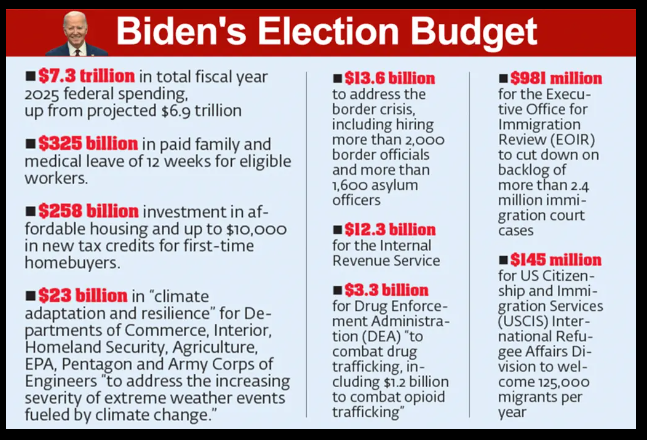
Congress’s budget: another thriller
The budget war in Congress did not subside for a moment. At the very end of February, when congressmen were due to come out of a short vacation, a real budget battle was about to take place. The likelihood of a shutdown, a suspension of the U.S. government, then rose to 50% because of the extreme division in Congress. The right wing of the Republicans demanded to cut government spending by 100 billion dollars. “Financial militarists”, in turn, called for tranches to Ukraine without any budgetary conditions, and the Democrats literally called European politicians and begged them to bypass Speaker Mike Johnson to put the bill with tranches to a vote, so that the burden of subsidies for Kiev did not fall on the shoulders of Germany and France.
This could only happen if at least 3-4 Republicans voted with the Democrats. The Congress has successfully passed a bill bypassing the Speaker only twice in the last 25 years, and Mike Johnson flatly refuses to agree on Ukrainian tranches, which he agreed with Trump. Meanwhile, Trump has called for fighting America’s real enemies, and they are, in his view, inside the country, not outside. He accused Democrats of trying to replace crosses with rainbow flags. This rhetoric resonates with Americans who care more about domestic agenda than foreign policy and is part of Trump’s election campaign.
Democratic senators, on the other hand, revisited Kiev during that period, trying to play up the contrast with Trump. However, the Ukrainian agenda is becoming increasingly toxic in the U.S., and Zelensky’s Fox News interview only garnered tens of thousands of views. Public opinion has not been on Ukraine’s side for a long time, and this adds to the Republicans’ determination to block any tranches and stand on the terms of their own spending plan.

As a result, on February 29, the U.S. was again on the verge of a shutdown, as negotiations between Republicans and Democrats on a new budget again reached an impasse. The text of the budget was supposed to be released on February 24, but due to serious disagreements over government spending, this did not happen, and the deadline for its adoption was supposed to expire on March 1. The White House is pressuring Republicans to make concessions and agree on all spending, including tranches to Ukraine and Israel but right-wing Republicans still want to cut government spending by at least $100 billion and freeze any foreign tranches. Trump’s supporters are also raising the issue of the southern border of the United States, where the migration crisis is raging.
Moreover, for the first time, a majority of Americans support building a wall on the border with Mexico, and for 84% it is the issue of migration, not overseas wars, that is a priority. The general background, when the U.S. is stuck in two wars in Ukraine and the Middle East, raises the degree of confrontation in Washington. Shakedowns have happened many times, but now the stakes are much higher in a highly polarized society. At the same time, Ukrainian forces are retreating under Russian attacks, and the Houthis are cutting the internet cables connecting Europe and Asia, undermining not only global trade, but also telecommunications and financial markets.
It’s this second tragic condition that is hurting the budget crisis. Congress was again at a crossroads, and could well pass a temporary budget for another 2-3 months, prolonging the agony, or bring the matter to a shutdown, when the Pentagon would run out of money to fight all wars and even the current needs of the army. There was no grand budget deal in sight, Washington was paralyzed, and there was a sense that the divide would only intensify as the presidential election approached.

Photo by Greg Bulla / Unsplash.com
On the penultimate day of winter, lawmakers were in a state of wild haste trying to close their budget issues, because in 2 days it was necessary to pass the first budgets, otherwise the U.S. threatened first a partial and after March 8 a full shutdown with a government shutdown. A special issue, as always, was the issue of military tranches. Republican senators began one after another to recognize the deplorable state of Ukraine on the front, and to say that they expect negotiations with Russia on the division of Ukraine to begin, and that is why the Republicans are distancing themselves from Kiev. For them, party discipline coupled with Trump’s growing influence ended up being more important than personal commercial interests.
The “militarists” in the Democratic Party had a completely different agenda, and they tried to put pressure on Speaker Mike Johnson, demanding to agree on at least some tranches. However, they were unsuccessful, because the Speaker had already promised his fellow party members to deal with more important things, such as the migration crisis and the shutdown, and not with “overseas wars”. Macron’s recent calls for NATO troops in Ukraine also drew a very sharp reaction among Republicans.
No one in Washington was ready to sign on to this amid the unpopularity of the war in Ukraine. There was also an understanding that this was some kind of strange populism, and if Europeans were sent there, it would be only in case of a complete collapse of the front and for the sake of trying to keep at least western Ukraine under their control. Congress had until March 10 to deal with budgets, but then lawmakers would be back in their districts preparing for the upcoming elections. The coming weeks threatened to be crucial for Ukrainian lobbyists, because the closer the elections, the harder it would be to negotiate tranches. And the worse situation would be for Kiev, which the West already predicts will collapse in 2024.

Already in early March, after six months of battles, lawmakers tried to find a budget compromise and allocate $436 billion for the work of some departments until September 30. However, the battles over Pentagon budgets continued, and it was still facing a shutdown on March 22. By that time, Republicans were able to achieve cuts in spending on the environment and the FBI. The FBI budget would be cut by 6% in retaliation for politicizing justice with Trump’s prosecution. Funding for border patrol agents, who were being faulted for failing to stem the flow of illegals, was also in question. But the main issue was still military budgets. Republicans were outraged at the politicization of the Pentagon with the imposition of a racially and gendered agenda.
In addition, there were many questions about the corruption of defense contracts and the crisis of the U.S. military-industrial complex, which was unable to produce more weapons. The political chaos in Washington has already caused the capitalization of U.S. military corporations to fall, with Lockheed Martin down 10% and Raytheon down 9%. They are incurring losses with many government contracts that Congress has not renewed for a long time. Reputational losses with the destruction of U.S. weapons like Patriot and Abrams in Ukraine are also taking their toll. It was at that time that Speaker Mike Johnson promised to consider a new tranche plan by April, with more money going to the U.S. border and less to Ukraine and Israel. However, by that time, the split in Congress could have grown even stronger amid Kiev’s failures and unresolved migration issues in America.
After realizing that the Republicans had their own draft budget, a real war broke out in Washington over the next military budget. Republicans demanded to cut spending even on defense, just to somehow stabilize the situation with the national debt, and the White House was initially forced to make concessions. The next U.S. military budget will grow by only 1% to $850 billion, and the Pentagon will spend much less on new weapons purchases. For example, it will order 70 F-35 fighter jets instead of 83, even though there are already big problems with their production due to a shortage of rare earth metals from China.

Photo by Anna Moneymaker / Maine Morning Star
In addition, the U.S. will build only one Virginia-class submarine instead of two. The program of upgrading intercontinental missiles with the replacement of Minuteman with Sentinel is now also in question. The cost of this project has already reached hundreds of billions of dollars, and Congress proposes to simply cancel it. The situation was also difficult with the replenishment of the Pentagon’s reserves, which were partially spent in Ukraine and Israel. The latter is still being sent arms tranches bypassing Congress, and lawmakers call it a vicious violation of budget rules and threaten Biden with proceedings.
Congress managed to pass some non-military budgets at the last minute and avoided a shutdown by creating the usual temporary budget. Republicans finally secured spending cuts of 10% for the environment and 6% for the FBI. The military spending proceedings were also postponed until March 22, but right-wing Republicans wanted even tougher cuts. Because of this, the “militarists” panicked and criticized the Trumpists for their austerity tendencies, citing the fact that China’s military budget was growing at 7% a year, and in the new arms race, Washington, paralyzed by the split, was already clearly lagging behind.
On March 10, Biden decided to launch a decisive offensive, and the White House unveiled a draft budget for next year. It was proposed to be a record 7.3 trillion dollars. If we take into account that in 2023 the U.S. revenues amounted to 4.5 trillion dollars, then in 2025 the budget deficit would have reached as much as 3 trillion dollars. Biden’s team went into outright populism, and wanted to hand out money to everyone under the election, aiming to satisfy all the intelligence agencies and the Pentagon up to the welfare recipients. At the same time there was a plan to sharply increase taxes on the rich and corporations in order to somehow compensate for spending.

Prt scr / New York Post
However, the White House had no chance of passing such a budget, because with a deficit of 3 trillion dollars, the growth of the U.S. national debt would have become completely unmanageable. Ukrainian tranches were also in limbo, although lobbyists had planned to push them through in April and May, realizing that it would be almost impossible to do so. Training programs for Ukrainians and joint purchases of equipment were also in question. Even the Canadians are now unable to order new NASAMS air defense systems to replace those destroyed in Ukraine, and the Americans won’t give money for this, although it will still take 2-3 years to produce them. In general, the mood in the White House was very negative about the success of budget confrontations with Congress.
During this period, another Biden apparatchik, the Secretary of Housing and Urban Development, resigned, and many Biden supporters would like to make such a decision before the upcoming election with a questionable outcome. At the same time, only 37% of Americans thought Biden was respected on the world stage, and only 33% were satisfied with the U.S. standing in the world, and the budget mess only added to public discontent.
For a moment, it even seemed that no one needed a budget compromise before the election, and the confrontation added points for the Democrats as well. Congress was in an emergency mode trying to approve all budgets before the March 22 deadline. If they didn’t, the U.S. government would once again face a shutdown and entire departments, including the Pentagon, would be suspended indefinitely. However, no one was going to go to the stupors, and the Republicans were indignant at the lack of major cuts in government spending, although the U.S. budget deficit in 2024 may reach 3 trillion dollars, and the debt every 3 months increases by another 1 trillion.

The Democrats, on the other hand, were unhappy that government spending was basically slightly reduced because they relied on welfare recipients as their primary constituency. In addition, it should be understood that spending on the FBI was cut by 6% precisely in retaliation for Trump’s prosecution, and there was a threatened reformatting of the border security agency to force it to crack down on illegal immigration, both of which were a fundamental blow to the Democrats. Also, the military budget will increase by 1%, which is far below inflation, and means a de facto reduction in its funding. Under such conditions, the Pentagon will be forced to buy fewer fighter jets and submarines, and the Republicans have offered to allocate only 12 billion to Ukraine, and even that in the form of a loan. This caused outrage in the White House and hysteria in Kiev, where they can’t pay off intern debts because of a 40-50 billion dollar hole in the budget.
As a result, Congress would go on vacation again on March 23, only to return after April 9 for two weeks. With elections ahead, lawmakers spent more time closer to their own constituents. We will tell you how things unfolded on the budget front in April in next publications.

